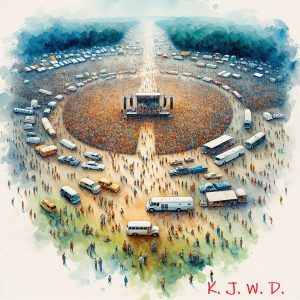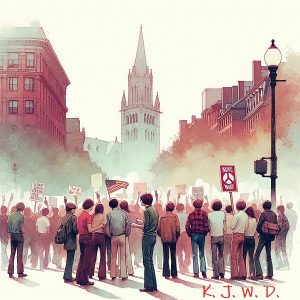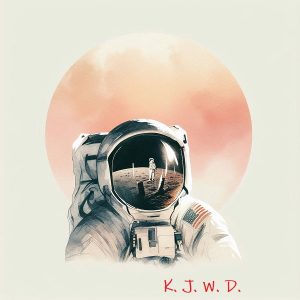
Retrospect – I Was At Woodstock in 1969
By Kevin J. W. Driscoll (c) 2025
Preface:
The Day My Brother’s VW Wagon Became a Portal to Another Dimension (and Other Slightly Exaggerated Truths)
They say if you remember the ’60s, you weren’t really there. Well, I remember the ’60s, or at least a very muddy, music-saturated weekend in August 1969, and I’m pretty sure I was there. Or, at least, a version of me was. Perhaps several versions, thanks to the sheer density of cosmic energy emanating from Max Yasgur’s farm.
This isn’t just a story about Woodstock. It’s a story about my brother Bill, whose driving skills were only slightly less erratic than the weather patterns that weekend. It’s also about Mary Anne, his wife, who could identify any song within the first three notes and possessed the uncanny ability to conjure up a perfectly brewed cup of chamomile tea from the depths of a mud-splattered cooler. And it’s about me, a wide-eyed idealist who thought peace and love could solve everything (and, let’s be honest, I still kind of do).
We piled into Bill’s battered VW Wagon, a vehicle that, in retrospect, was less a car and more a mobile portal to another dimension, and set off on a pilgrimage that would redefine our understanding of music, mud, and the sheer power of communal spirit.
This is a short tale of how we navigated the chaos, the rain, the legendary performances, and the philosophical debates with mud-covered squirrels (yes, you read that right). It’s a story of tie-dye, transcendental guitar solos, and the undeniable feeling that we were part of something truly extraordinary. We were !
So, grab a cup of tea (or something stronger), settle in, and prepare to be transported back to a time when music was magic, the world was changing, and the mud was… well, let’s just say it was an experience. Welcome to my slightly skewed, but entirely heartfelt, version of Woodstock 1969.
*
The backseat of Bill’s beat-up Volkswagen Wagon was a symphony of chaos and anticipation. My brother, Bill, navigated the winding roads of upstate New York with the intensity of a concert pianist, while his wife, Mary Anne, regaled us with tales of the festival’s legendary status.
“They say Jimi Hendrix is gonna play his guitar while it is on fire,” she declared, her eyes sparkling with excitement. “And Janis Joplin is gonna belt out ‘Piece of My Heart’ until the cows come home!”
I leaned forward, my heart pounding in my chest. “And what about the food? Is it true they’re serving organic granola with a side of peace-loving vibes?”
Mary Anne chuckled. “Don’t worry, kiddo. There’ll be enough food to feed an army, and the vibes are guaranteed to be peace-loving.”
As we neared the festival grounds, the cacophony of sound grew louder – guitars wailing, drums pounding, and a sea of voices chanting in unison. The air crackled with an electric energy, a palpable sense of anticipation hanging heavy in the air.
“Hold on tight!” Bill yelled over the din, his foot firmly planted on the gas pedal.
We lurched forward, the Bug bouncing along the muddy road like a bucking bronco. Finally, we reached our destination – a sprawling field teeming with humanity, a kaleidoscope of colors and textures.
“Welcome to Woodstock!” Mary Anne announced, her voice barely audible above the din.
We clambered out of the car, blinking in the sudden sunlight. The scene before us was nothing short of breathtaking. A sea of humanity stretched as far as the eye could see, a patchwork quilt of tie-dyed shirts, flowing dresses, and peace signs. Music pulsed through the air, a vibrant tapestry of sound that seemed to envelop us completely.
We found a spot on a grassy knoll, staking our claim with a patchwork blanket and a cooler overflowing with provisions. As the sun began to set, casting long shadows across the field, the music reached a fever pitch. Jimi Hendrix took the stage, his guitar a fiery serpent in his hands. The crowd roared as he launched into his iconic rendition of “Foxy Lady” a musical masterpiece that redefined sexual attraction.
As the night wore on, the music continued to flow, a river of sound that carried us away on a wave of euphoria. We danced, we sang, we laughed, and we lost ourselves in the magic of the moment. Woodstock was more than just a music festival; it was a communal experience, a shared journey into the heart of the human spirit.
*
As the sun rose the next morning, casting a golden glow over the sea of humanity, we emerged from our makeshift tent, our bodies sore but our spirits soaring. The music had continued throughout the night, a relentless wave of sound that had washed over us, carrying us away on a tide of euphoria.
We stumbled towards the main stage, our senses still reeling from the previous night’s revelry. The crowd was already thick, a sea of faces turned towards the stage, anticipation building as the first notes of music began to filter through the air.
“It’s Sly and the Family Stone!” someone yelled, and the crowd erupted in a cheer.
We pushed our way to the front, eager to catch a glimpse of the legendary band. Sly Stone, a whirlwind of energy, commanded the stage, his music a potent mix of funk, soul, and rock and roll. The crowd danced and swayed, their bodies moving in unison to the infectious rhythm.
As the day wore on, we were treated to a succession of legendary performances. Janis Joplin, her voice raw and powerful, delivered a soul-stirring rendition of “Piece of My Heart” that brought the crowd to its feet. The Who, their music a raw and powerful testament to the spirit of rock and roll, tore through their set with ferocious energy.
But it was Jimi Hendrix’s closing performance that truly stole the show. As the sun began to set, casting long shadows across the field, Hendrix took the stage, his guitar a fiery serpent in his hands. He launched into a psychedelic rendition of “The Star-Spangled Banner,” his guitar wailing and moaning like a wounded animal. The crowd was mesmerized, their eyes fixed on the stage as Hendrix wove his magic, transforming the national anthem into a powerful anti-war anthem.
As the final notes of Hendrix’s performance faded away, a sense of peace and tranquility descended upon the crowd. We had witnessed history in the making, a moment that would forever be etched in our memories.
–30–





